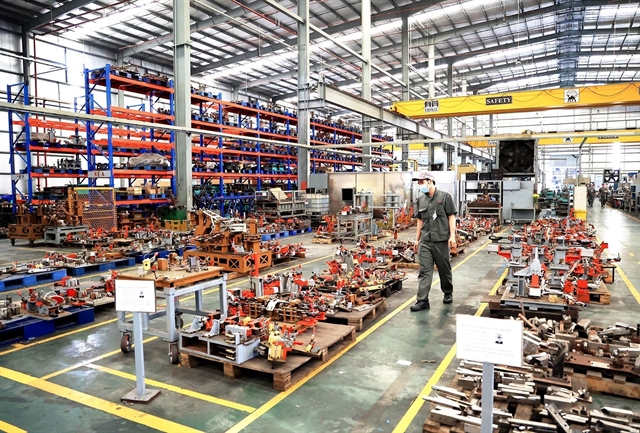Ample room remains for VN-Japan cooperation in supporting industries
"We see high potential in supporting industries in Việt Nam," Yasuo Shimokura, General Director of MISUMI Vietnam - a manufacturer and distributor of standard components for factory automation based in Bắc Ninh Province told Việt Nam News.
 |
|
A mechanical components warehouse of Global Powersports Manufacturing Incorporation in the southern province of Đồng Nai. — VNA/VNS Photo Hồng Đạt |
HÀ NỘI — There remains ample room for Vietnamese and Japanese enterprises to foster cooperation in supporting industries that are increasingly developing and playing an important role in Việt Nam's participation in the global supply chain as well as the global value chain, insiders have said.
Untapped potential
"We see high potential in supporting industries in Việt Nam," Yasuo Shimokura, General Director of MISUMI Vietnam - a manufacturer and distributor of standard components for factory automation based in Bắc Ninh Province told Việt Nam News.
"We are now focusing on developing partnerships with Vietnamese suppliers that can work as Misumi Vietnam’s original equipment manufacturers. More and more suppliers are becoming competitive to provide good quality products with very reasonable prices."
He said: "In addition, I have seen many cases of Vietnamese engineers who worked at prestigious Japanese or European manufacturing companies started up their own material processing or machine building companies. In these 4-5 years, the level of these companies has been steadily improving."
"As Việt Nam's economy grows, I believe this trend will continue and the supporting industries in Việt Nam will surely grow and become strengthened," the representative from MISUMI Vietnam said.
A representative from TânCơ Consulting and Trading JSC in Hà Nội agreed.
"Việt Nam is a developing country and attracts huge foreign direct investment from developed countries in Asia and the world, so the demand for supporting industries is extremely large," he told Việt Nam News.
"Foreign investors always want to look for supporting companies in many fields to specialise and save costs. The supporting industry in Việt Nam is still young, so the potential of this industry is huge," he said.
Prospects for Việt Nam-Japan cooperation
The representative said Japan is a developed country and is very strong in engineering and technology while Việt Nam is a developing country with an abundant workforce of all ages.
"Vietnamese businesses in supporting industries want to cooperate with Japanese businesses to exchange, learn and exchange techniques and technology. Thus, I think cooperation prospects between Japanese and Vietnamese businesses in this field see positive prospects ahead," he said.
Sharing his idea, General Director of MISUMI Vietnam said coordination in supporting industries between Vietnamese and Japanese companies has enjoyed many good opportunities and potential for development.
However, both Vietnamese and Japanese companies in the field and the Vietnamese Government should facilitate the cooperation, he said.
To attract more Japanese companies in supporting industries to come and invest in the country, Yasuo suggested that the State should accelerate reform toward a more transparent, fair legal and regulatory environment.
The Japan External Trade Organisation and the Japan International Cooperation Agency should enhance current activities for business matching between Japanese and Vietnamese companies, he said.
"The quality of the supporting products should be more high level," he suggested.
For his part, the representative from TânCơ Consulting and Trading JSC said it is necessary to have effective policies from the Government to help businesses in supporting industries especially small and medium-sized ones further develop in terms of capital, costs, procedures, taxes, land, technology and skilled workforce.
"Though Việt Nam's policies in supporting industries have been fully promulgated over the past time, in practice, there are still many shortcomings."
"Not to mention, the legal documents related to the supporting industry are only at the level of decrees and circulars, while the supporting industry is an important area, Việt Nam fails to have a law on this field."
"Thus, policies on developing supporting industries are there, but they have yet to create a good enough legal corridor for enterprises to develop," he noted.
Việt Nam is now home to about 2,000 enterprises manufacturing spare parts and components. Of them, 300 have participated in global support chains, providing more than 600,000 jobs, according to the Ministry of Industry and Trade (MoIT).
These businesses have continuously tried to improve product quality, strengthen competitiveness, and meet strict market requirements, it said, adding that the State has created favourable conditions for supporting industry firms to sharpen their competitiveness.
To promote supporting industries, the MoIT has proposed to the Government policies to support enterprises operating in supplying parts and materials for garment and textile, footwear, electronics, automobile production and assembly and mechanical engineering to promote the development of supporting industries in Việt Nam.
The proposed support policies, including an interest rate subsidy of 3 per cent, are expected to create a stimulus to part-supplying enterprises to improve their competitiveness and participate in the supply chains of multinational corporations (MNCs).
The ministry said that enterprises must not be subject to global minimum tax to be eligible for the support policies.
The support would include corporate income tax incentives, support in investment promotion, human resource training, research and development, technology application, renovation and transfer and credit support to enable domestic enterprises to become suppliers of MNCs, according to the ministry.
The priority would be given to sectors including garment and textile, footwear, electronics, automobile production and assembly and mechanical engineering, besides others, including moulds, mechanical details with high-quality standards used for electronics, mechatronics, microelectronics, robots, electronic and optoelectronics components, circuits and new materials.








